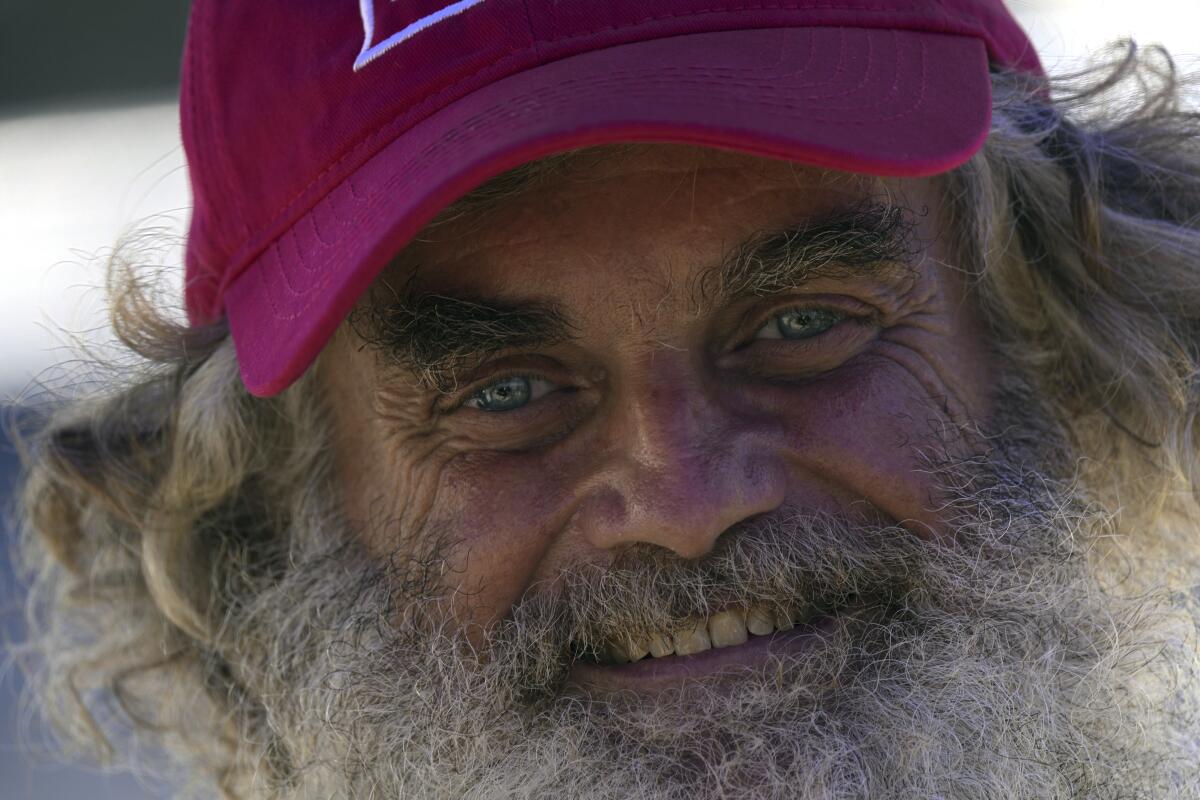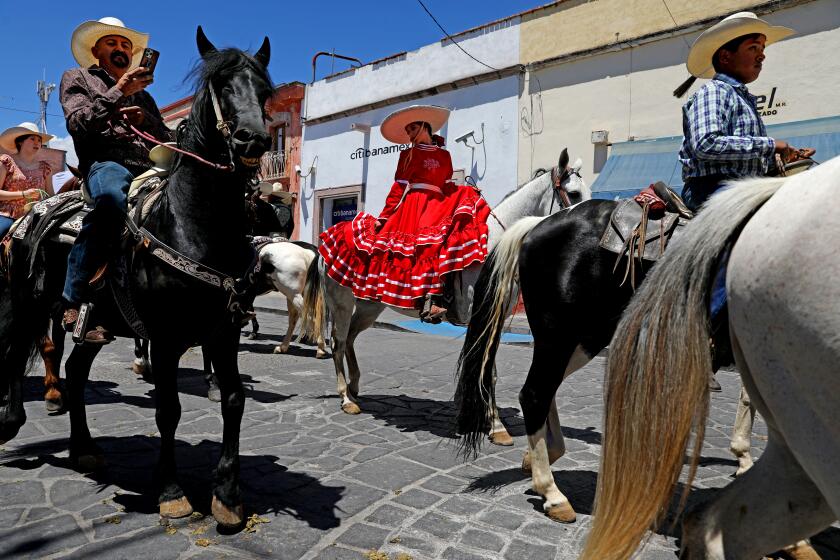Rescued Australian man who was adrift 3 months in Pacific with dog ‘grateful’ to be alive

- Share via
MANZANILLO, Mexico — An Australian sailor who was rescued by a Mexican tuna boat after being adrift at sea with his dog for three months said he is grateful to be alive after setting foot on dry land for the first time since their ordeal began.
Timothy Lyndsay Shaddock, 54, disembarked in the Mexican city of Manzanillo after being examined on board the boat that rescued him, the María Delia.
“I’m feeling all right. I’m feeling a lot better than I was, I tell ya,” Shaddock, smiling, bearded and thin, told reporters Tuesday on the dock in the port city about 210 miles west of Mexico City.
“To the captain and fishing company that saved my life, I’m just so grateful. I’m alive and I didn’t really think I’d make it,” Shaddock said, adding that he and his “amazing” dog, Bella, are both doing well.
Shaddock described himself as a quiet person who loves being alone on the ocean. Asked why he set out in April from Mexico’s Baja California Peninsula to cross the Pacific Ocean to French Polynesia, he was initially at a loss.
“I’m not sure I have the answer to that, but I very much enjoy sailing and I love the people of the sea,” he said. “It’s the people of the sea that make us all come together. The ocean is in us. We are the ocean.”
As crime engulfs many Mexican states, immigrants who’ve saved to retire there are reevaluating ties to home — and whether returning is worth the risk.
The Sydney man’s catamaran set sail from the Mexican city of La Paz but was crippled by bad weather weeks into the journey. He said the last time he saw land was in early May as he sailed out of the Sea of Cortez and into the Pacific. There was a full moon.
Shaddock said he had been well-provisioned, but a storm knocked out his electronics and ability to cook. He and Bella survived on raw fish.
“There were many, many, many bad days and many good days,” he said.
“The energy, the fatigue is the hardest part,” he said. He passed the time fixing things and stayed positive by going into the water to “just enjoy being in the water.”
When the tuna boat’s helicopter spotted Shaddock’s catamaran about 1,200 miles from land, it was the first sign of humans he had seen in three months, Shaddock said. The pilot tossed him a drink and then flew away, returning later with a speedboat from the María Delia, he said.
Grupomar, which operates the fishing fleet, didn’t specify when the rescue occurred. But it said in a statement that Shaddock and his dog were in a “precarious” state when found, lacking provisions and shelter, and that the tuna boat’s crew gave them medical attention, food and hydration.
Start your day right
Sign up for Essential California for the L.A. Times biggest news, features and recommendations in your inbox six days a week.
You may occasionally receive promotional content from the Los Angeles Times.
Shaddock said that the tuna boat became his land and that Bella was an immediate hit with the crew. He also explained how he and the dog met.
“Bella sort of found me in the middle of Mexico. She’s Mexican,” he said. “She’s the spirit of the middle of the country and she wouldn’t let me go. I tried to find a home for her three times and she just kept following me onto the water. She’s a lot braver than I am, that’s for sure.”
Perhaps for that reason, Bella did not leave the boat until Shaddock had driven away Tuesday. He had already chosen Genaro Rosales, a crew member from Mazatlan, to adopt her on the condition that he would take good care of the dog.
Shaddock said that he’ll be returning to Australia soon and that he’s looking forward to seeing his family.
There have been other stories of extreme ocean survival, but they do not all end happily.
Amid a series of booming eruptions, Mexican authorities have told millions who live near the Popocatépetl volcano to prepare for possible evacuation.
In 2016, a Colombian fisherman was rescued after spending two months adrift in the Pacific Ocean. Three of his crew mates died. He was rescued by a merchant ship more than 2,000 miles southeast of Hawaii. He and the others had been fishing off Colombia’s coast when their skiff’s motor failed, leaving them adrift.
In 2014, a Salvadoran fisherman washed ashore on the tiny Pacific atoll of Ebon in the Marshall Islands after drifting at sea for 13 months. Jose Salvador Alvarenga and a crew mate left Mexico for a day of shark fishing in December 2012. He said they survived on fish, birds and turtles, but the crew mate died before his boat washed ashore 5,500 miles away.
In other cases, boats are found, but without survivors, or are lost entirely.
More than 20,000 migrants have died trying to cross the Mediterranean Sea to Europe since 2014, according to the International Organization for Migration.
Antonio Suarez, Grupomar’s president, said Tuesday that this could be the María Delia’s final trip because he is modernizing the company’s fleet and the boat is its smallest and is more than 50 years old.
If so, it would be a “marvelous farewell, saving human lives,” Suarez said.
More to Read
Sign up for Essential California
The most important California stories and recommendations in your inbox every morning.
You may occasionally receive promotional content from the Los Angeles Times.












